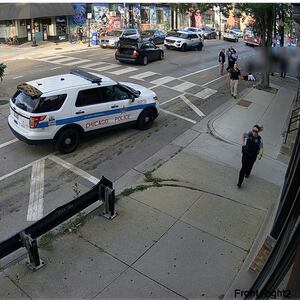It took about three seconds for five Detroit officers to kill Porter Burks as he advanced toward them in the throes of a mental health episode on Sunday. Along the way, they fueled new questions about whether even those cops who are specifically intended to help people in crisis do anything at all to make people of color less likely to die in a hail of police bullets.
Police say that Burks, a 20-year-old Black man diagnosed with schizophrenia, was carrying a knife around 5 a.m. on Sunday when they responded to the scene. Body-camera footage from a crisis intervention officer on hand shows Burks standing in the middle of the street while officers offer him help several times and ask him to put the weapon down.
“I just want to help you, man, OK? Can you do me a favor and drop the knife? Can you drop the knife for me? Please? Please, whatever you’re going through, I can help you. Porter, you’re not in any trouble, man,” the cop is heard saying in the video released by the department on Tuesday.
But the de-escalation tactics appeared to cease about four minutes into the negotiations, when Burks is seen running toward the officers. Within moments, five cops unleashed 38 bullets toward him. Police say that Burks, who was about six feet away from the officers, was hit at least 15 times by gunfire. The police department has not released the names of the officers who fired, but offered the traditional indication that they are on administrative leave pending an internal investigation.
Attorney Geoffrey Fieger, who is representing the Burks family, told The Daily Beast on Thursday the family was demanding answers for a situation he equated to an “execution” that should have never happened.
Fieger argued that Burks’ killing exemplifies the inadequacies of the mental health system—and shows how police officers are often too quick to use force during a mental health crisis, even when they ostensibly are trying to avoid inflicting lethal harm. The lawyer added that he and the family are planning to sue the Detroit Police Department and the officers who carried out the shooting, alleging negligence and civil rights violations.
The pending lawsuit was first announced during a Thursday news conference, where Fieger stood behind Burks’ family as he chastised the department and demanded answers, claiming the 20-year-old was handcuffed after being shot. After the deadly incident, Fieger said, Burks was “dumped” at the hospital, where he was pronounced dead.
“This lawsuit is about alerting the public about the realities of limited mental-health resources in Michigan and standing against the status quo,” Fieger told The Daily Beast. “Things need to change in Michigan. Nobody deserves to go through what this family is going through.”
A spokesperson for Detroit Police did not immediately respond to a request for comment.
Fieger added that the family has “been on a rollercoaster” since Burks was killed on Sunday. Police initially told the public that officers used a stun gun on Burks before the shooting—before Chief James White admitted on Tuesday that it was unclear if the de-escalation tactic was actually used. The admission came during a Tuesday press conference in which White released the body-camera footage of Burks’ killing and defended his officers’ actions.
“The officers had to stop the threat,” White added. “There’s no time in the three seconds and someone charging at you with a knife to look over and see what other people are doing.”
In the body-camera footage, officers can be seen speaking with Burks' brother, who is explaining that the 20-year-old had slashed his tires and was frantic.
Department of Professional Standards director Chris Graveline stressed Tuesday that Burks was a victim of “a system that has failed [him] on several different occasions” and detailed several previous instances where he had been violent with his family. Family members, however, told local media that Burks was a sweet and laid-back man who loved music.
His mother, Quieauna Wilson, told the Detroit Free Press Burks was the third out of her seven children and loved to dance. She admitted that her family struggled to navigate their new reality after his diagnosis.
“Porter needed help,” Fieger added to The Daily Beast. “Instead, he was executed.”







